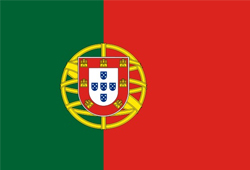Portuguese (português) or língua portuguesa) is a Romance language that originated in what is now Galicia and northern Portugal. It is derived from the Latin spoken by the romanized Pre-Roman peoples of the Iberian Peninsula (namely the Gallaeci, the Lusitanians, the Celtici and the Conii) around 2000 years ago. It spread worldwide in the 15th and 16th centuries as Portugal established a colonial and commercial empire (1415-1999). It was used as the exclusive lingua franca on the island of Sri Lanka for almost 350 years. During that time, many creole languages based on Portuguese also appeared around the world, especially in Africa, Asia, and the Caribbean.
Today it is one of the world's major languages, ranked 6th according to number of native speakers (between 191 and 230 million). It is the language of about half of South America's population, even though Brazil is the only Portuguese-speaking nation in the Americas. It is also a major lingua franca in Portugal's former colonial possessions in Africa. It is an official language in nine countries (see the table on the right), also being co-official with Cantonese Chinese in Macau and Tetum in East Timor.
In various aspects, the system of sounds in Portuguese is more similar to the phonologies of Catalan or French than, say, those of Spanish or Italian.
|
|
 |